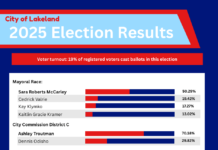Lilyana Vasquez
News Editor
The suspension of Jimmy Kimmel has left television hosts on edge, igniting a national debate over censorship, free speech and the role of media entertainment.
As politicians, networks and viewers clash over censorship and corporate responsibility, the controversy underscores how comedy has become an unexpected battleground in America’s cultural wars.
Kimmel’s comments on Kirk’s death sparked controversy after his Sept. 19 show. “The MAGA gang [is] desperately trying to characterize this kid who murdered Charlie Kirk as anything other than one of them and doing everything they can to score political points from it,” Kimmel said.
Following this comment, The Walt Disney Company, ABC’s parent company, suspended Kimmel’s show indefinitely. The suspension went into effect on Sept. 17 after the head of the Federal Communications Commission (FCC) Brendan Carr, threatened to punish ABC for Kimmel’s comment.
“These companies can find ways to take action on Kimmel or there is going to be additional work for the FCC ahead,” Carr said.

After the decision was made to suspend Kimmel, President Donald Trump posted on Truth Social, his social media network, congratulating ABC for its “courage” in removing the show. Trump’s remarks intensified concerns that political pressure could limit comedians’ free speech, making satire riskier for show hosts.
Despite the reasoning behind the suspension, Disney received immense pushback from the public. According to NBC News, Google searches for terms like “cancel Disney Plus” and “boycot Disney” increased during this period. Additionally, hundreds of big influencers such as Olivia Rodrigo, Tom Hanks and Pedro Pascal signed an open letter published by the American Civil Liberties Union speaking out in protest of Kimmel’s removal from the airwaves. In an interview by NPR with Jonathan Handel, a Los Angeles entertainment attorney, Handel stated, “This is just the beginning of a widespread boycott emerging in the fight for free speech.”
Alan Schleden, president of FSC’s comedy show Studio Box, echoed his concern, noting that comedians have long used humor to highlight serious issues.
“Comics have been making political jokes … about things for as long as they’ve existed; it just matters on what scale,” Schleden said. “The government stepping into any sort of art or creation is never the best idea, as it has historically been used … as a way to have a voice and have an opinion on things … [art] is the voice of the people.”
Other comedians reacted with fear and anger. David Letterman, the veteran late-night host, said networks shouldn’t fire people simply because they refuse to “suck up” to leading officials. On his own program, Stephen Colbert blasted ABC’s decision as “blatant censorship” and declared, “tonight we are all Jimmy Kimmel.”
The message behind the suspension was unmistakable, wrote James Poniewozik, The Times’s chief TV critic: “Maybe it’s just better to be cautious. Maybe don’t say anything that gives your haters an opening. Maybe don’t say anything rash. Maybe don’t say anything.”
The late-night talk show returned to ABC on Sept. 26. Nexstar and The Sinclair Broadcast Group had both initially pulled the show off air. However, after discussions with Disney, the show was back on air after a week. “As a local broadcaster, Nexstar remains committed to protecting the First Amendment while producing and airing local and national news that is fact-based and unbiased and, above all, broadcasting content that is in the best interest of the communities we serve,” press release from Nexstar to NPR said.
The Sinclair Broadcast Group, said, “these events underscore why responsible broadcasting matters and why respectful dialogue between differing voices remains so important.” The networks’ statements emphasize a commitment to protecting the First Amendment and promoting responsible, balanced broadcasting.
Overall, this conflict shows how late-night shows are now facing censorship concerns. With viewers now wondering, “Can comedy still thrive in an era where political sensitivities dominate?” CNN’s chief media analyst Brian Stelter said.
“It’s a tug-of-war situation, and you can feel people on both sides tugging back and forth,” Stelter said.
Kimmel’s situation reflects a larger battle for comedy hosts navigating satire, politics and corporate interests. His suspension and return show the precarious balance between comedy and politics, raising questions about whether entertainers can still push boundaries without becoming targets in cultural wars. The future of political satire remains uncertain, caught between free speech, backlash and corporate caution. Despite this, Schleden believes comedy will endure.
“It’s an industry that I think will always be around, especially as times get harder or things get rougher. People look for those outlets. People want to laugh.”







